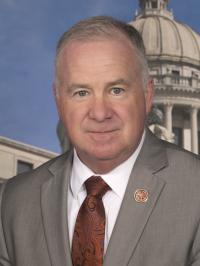| SB 3049 |
Known as the "Mississippi Back-to-Business Liability Assurance and Health Care Emergency Response Liability Protection Act," this legislation will help protect businesses and healthcare providers against frivolous COVID-19-related claims. This vital legislation will preserve both justice and economic recovery in Mississippi by enacting reasonable safeguards against a potential surge of coronavirus lawsuits. The business vote was for the legislation. |
YEA |
NAY |
View Vote |
| HB 1783 |
This legislation would have protected businesses against frivolous COVID-19-related claims. While this bill did not pass, the business protection provisions were covered in the passage of SB 3049, the "Mississippi Back-to-Business Liability Assurance and Health Care Emergency Response Liability Protection Act." The business vote was for the legislation. |
YEA |
NAY |
View Vote |
| HB 1783 - A1 |
This amendment would have significantly weakened the liability protections against frivolous COVID-19-related claims. The business vote was against the amendment. |
NAY |
YEA |
View Vote |
| HB 1783 - A2 |
This amendment would have significantly weakened the liability protections against frivolous COVID-19-related claims. The business vote was against the amendment. |
NAY |
YEA |
View Vote |
| HB 1779 |
This legislation would have protected healthcare workers against frivolous COVID-19-related claims. While this bill did not pass, the protection provisions for healthcare workers were covered in the passage of SB 3049, the "Mississippi Back-to-Business Liability Assurance and Health Care Emergency Response Liability Protection Act." The business vote was for the legislation. |
YEA |
NAY |
View Vote |
| HB 1779 - A1 |
This amendment would have significantly weakened the liability protections against frivolous COVID-19-related claims. The business vote was against the amendment. |
NAY |
YEA |
View Vote |
| HB 1243 |
The legislation increases penalties for trespassing or deliberately damaging a variety of energy facilities like pipelines and refineries. It will protect our crucial energy infrastructure and ensure families and small businesses continue to access essential energy services. HB 1243 will help ensure that legitimate free speech rights are protected while preventing fringe anti-energy activists from committing crimes, impeding, vandalizing, or trespassing on our critical energy infrastructure. The business vote was for the legislation. |
YEA |
YEA |
View Vote |
| HCR 79 |
HCR 79 suspended the procedural rules to allow legislation to be introduced to remove the state flag. BIPEC supported legislative efforts to change the state flag. The business vote was for the resolution. |
YEA |
NAY |
View Vote |
| HB 1796 |
HB 1796 removed the Mississippi state flag and created a group to design a new one that will be voted on in November. BIPEC's mission statement emphasizes that Mississippi businesses should 'unite, protect, and advance free enterprise.' Mississippi is always competing for economic development opportunities. The old flag put us at a disadvantage. The business vote was for the legislation. |
YEA |
NAY |
View Vote |
| HB 379 |
This legislation requires third-party sellers with sales of more than $250,000, such as Amazon and Walmart, to collect the state's 7% use tax on online purchases. The Department of Revenue estimated the tax could produce $30 million to $50 million annually, with 35 percent of that going to cities, counties, and the Local System Bridge Program as outlined in the 2018 law that taxes internet sales and diverts some of the use tax diversion to cities and counties. The business vote was for the legislation. |
YEA |
YEA |
View Vote |
| HB 837 |
This legislation would have required private insurance plans to cover specific health benefits. The costs associated with the mandate would ultimately result in increased premiums. This would impact the ability of small businesses to provide cost-effective health insurance. The state employees' health insurance plan and self-insured (ERISA) plans were exempted, making small businesses' financial impact even greater. The legislation passed in the House and was killed in the Senate. The business vote was against the legislation. |
NAY |
YEA |
View Vote |
| HB 750 |
This legislation would have changed the policy set many years ago by the Workers Compensation Commission (WCC) of sharing injured workers' contact information with lawyers looking to recruit clients. The legislation passed the House and failed in the Senate. The business vote was for the legislation. |
YEA |
YEA |
View Vote |
| HB 576 |
The "Livestock Liability" bill conforms Mississippi's livestock tort law to the remainder of Mississippi tort law. Before this law passed, the livestock owner had to prove they were not negligent in livestock escaping into the highway if there was an accident involving the livestock. Further, this was not consistent with the law on county roads. The Livestock Liability bill solved both issues. The business vote was for the legislation. |
YEA |
YEA |
View Vote |
| SB 2772 |
This legislation created two COVID-19 small business relief grant programs. It transferred $900 million of CARES Act funds for the legislature to appropriate and then created the $60 million Mississippi COVID-19 Relief Payment Fund and the $240 million Back to Business Mississippi Grant Fund. The business vote was for the legislation. |
YEA |
YEA |
View Vote |
| SB 2430 |
This legislation establishes a five (5) year statute of repose for civil actions against real estate appraisers, real estate brokers, and real estate salespersons. It provides additional protections for real estate brokers, salespersons, and appraisers. The main exception to the law change is when fraud is involved. This legislation helps protect business owners against frivolous lawsuits. The business vote was for the legislation. |
YEA |
YEA |
View Vote |
| SB 2709 |
The legislation could allow for an insurance rate reduction for commercial buildings statewide that are strengthened against wind damage according to standards set by the Mississippi Windstorm Mitigation Coordination Council and approved by the Commissioner of Insurance. The discounts are to be available for new construction and to any owner "who retrofits existing commercial insurable property to resist loss due to tornado or other catastrophic windstorm events." The business vote was for the legislation. |
YEA |
YEA |
View Vote |
| HB 1784 |
This legislation transferred $181,775,000.00 in CARES Act funds to the Unemployment Trust Fund. It also allows other unallocated but unstated CARES Act funds to go to the Trust Fund on December 30, 2020. This is an effort to avoid a potential tax increase if the fund drops below a certain amount. The business vote was for the legislation. |
YEA |
YEA |
View Vote |
| HB 1371 |
Lawmakers passed legislation to reform the Commercial Drivers' License (CDL) process. It allows for online renewal of CDLs, allows third-part examiners to give CDL tests as long as the examiner does not work for a trucking company, requires DPS to upload an updated medical card within five days of receiving the driver's information, and notifies a truck driver of their card being updated within 24 hours. The business vote was for the legislation. |
YEA |
YEA |
View Vote |
| SB 2328 |
This legislation improves the Emerging Crops Loan Program to keep up with poultry house construction's rising costs. The program began making loans in 1990. In 1990, an average four-house farm cost $300,000, now a farm with six, much-larger houses with much more technology, runs $2 million. The legislation increases the amount that can be loaned from $200,000 to $250,000 at one time and raised the lifetime cap from $400,000 to $500,000 under the revolving loan program. The bill also allows the issuance of $5 million more in bonds for the program. The business vote was for the legislation. |
YEA |
YEA |
View Vote |
| HB 1212 |
This legislation ensures that real estate brokers who are lawfully responsible for overseeing licensed salespersons have had ample opportunity to gain the necessary experience to oversee, train, and guide their agents. HB 1212 ensures security for consumers, brokers, and everyone involved in a real estate transaction. The business vote was for the legislation. |
YEA |
YEA |
View Vote |
| SB 2564 |
This legislation allows the State Workforce Investment Board (SWIB) to oversee the newly created Office of Workforce Development. The legislation also gives the office of workforce development oversight control of state-sourced workforce dollars, including the Workforce Enhancement Fund and the Mississippi Works Fund. The office will collaborate with the State Community College Board on the distribution and purpose of those funds. The business vote was for the legislation. |
YEA |
YEA |
View Vote |
| HB 1165 |
The bill would have required the state's K-12 public schools to offer computer science to all elementary and high school students. Under the legislation, the state would have taken a phased approach to introduce computer science starting in the 2021-2022 school year. The bill aimed to inspire and educate more students on academic and career opportunities associated with science, technology, engineering, and math-related studies. The legislation passed in the House and died in the Senate. The business vote was for the legislation. |
YEA |
YEA |
View Vote |
| SB 3051 |
This legislation prohibits a tax increase for a business's general experience rating. SB 3051 says, "charges attributed to each employer's individual experience rate for the period July 1, 2020, through December 31, 2020, will not impact the employer's individual experience rate calculations for purposes of calculating the total unemployment insurance rate for 2022 and the two (2) subsequent tax rate years." The business vote was for the legislation. |
YEA |
YEA |
View Vote |

